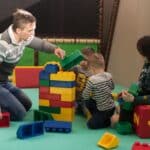Want to know how to help your deaf child? Helping a deaf child involves creating an inclusive and supportive environment that addresses their unique needs and allows them to develop to their fullest potential. Here are some steps and considerations to keep in mind:

Early Intervention
Early intervention is crucial for deaf children. The earlier you identify and address their needs, the better their chances of developing language skills and cognitive abilities. Consult with professionals who specialize in deaf education, such as audiologists, speech therapists, and educators.
Learn Sign Language
Depending on your child’s preferences and communication style, you might consider learning sign language, such as American Sign Language (ASL) or the sign language used in your country. This will enable effective communication and foster a stronger bond between you and your child. You can start learning the ASL alphabet with these printables.
Communication Choices
Explore different communication options based on your child’s needs and preferences. Some deaf children use spoken language with the help of speech therapy and hearing aids or cochlear implants, while others may prefer sign language or a combination of methods.
Hearing Aids or Cochlear Implants
If appropriate, consider hearing aids or cochlear implants. Consult with medical professionals to determine which option is best for your child’s specific hearing loss and needs.
Special Education Services
Work with your local school district to ensure your child receives appropriate special education services. Individualized Education Plans (IEPs) can outline the support your child requires, such as classroom accommodations, speech therapy, and additional resources.
Individualized Education Plan (IEP)
Work with educators to create an IEP that outlines your child’s unique needs and goals. Regularly review and update the plan to ensure their progress.
Deaf Community Involvement
Encourage your child to connect with the deaf community. Being part of a community that shares similar experiences and challenges can provide a sense of belonging and identity.
Visual and Tactile Learning
Deaf children often rely more on visual and tactile learning. Use visual aids, hands-on activities, and interactive learning techniques to enhance their understanding of concepts.

Reading and Literacy
Focus on developing your child’s reading and literacy skills. Books with visual elements and engaging illustrations can be especially helpful. Consider bilingual books that combine text and sign language.
Support Emotional Well-being
Deaf children may face unique emotional challenges related to communication and acceptance. Provide emotional support, and teach them coping strategies for dealing with potential social and emotional difficulties.
Encourage Independence
Help your child develop independence and self-advocacy skills. Encourage them to express their needs and preferences, and involve them in decisions about their education and communication methods.
Technology
Utilize technology to enhance communication and learning. There are numerous apps, online resources, and assistive devices designed to support deaf individuals.
Positive Reinforcement
Celebrate your child’s achievements and milestones. Positive reinforcement boosts their self-esteem and motivation.
Normalize Deafness
Teach your child that being deaf is a normal part of their identity, rather than a limitation. Encourage them to embrace their deafness and be proud of who they are.
Patience and Understanding
Understand that your child’s journey might have unique challenges. Be patient and offer emotional support as they navigate their deafness.
Advocacy
Advocate for your child’s needs within the school system, healthcare settings, and other environments. Ensure that their rights to accessible education and services are upheld.
Socialization Opportunities
Do encourage your child to engage in social activities and playdates with both deaf and hearing peers. This helps them develop social skills, friendships, and a sense of belonging.
Positive Mindset
Maintain a positive attitude and open communication with your child. Celebrate their achievements, no matter how small, and provide emotional support when they face challenges.
Deaf Role Models
Introduce your child to successful deaf individuals who can serve as role models. This can inspire them and show that deafness doesn’t limit their potential.
Inclusive Environment
Create an inclusive environment at home by involving your child in family activities, discussions, and decision-making. Make sure to address any communication barriers and adapt as needed.
Regular Check-ins
Have regular discussions with your child about their experiences, challenges, and goals. This will help you stay informed and provide the necessary support.
Remember that every child is unique, and what works best for one child might not work as effectively for another. Regularly assess your child’s progress, communicate openly with them, and collaborate with professionals to adjust strategies as needed.









👂❤️ Your guide on how to help a deaf child is both informative and heartwarming! 🤗🏡 Providing the right support and environment is crucial for their development. Thanks for sharing these valuable insights! 👏🌟👶
That’s good to know that the earlier you intervene with strategies, the better your deaf child’s chances of developing language skills!
I love this guide! I have never been around a deaf child before, but if I ever am, I will keep these tips in mind for sure.
Raising a deaf child does come with different things. This post was very useful.
This is going to be so great for those who may need this. I’ve been slowly trying to learn sign language because you never know when you could use it.
It is good to start early with providing the right support. These are great points to all consider.
The focus on early intervention and learning sign language is crucial, fostering effective communication. The exploration of communication choices and the mention of hearing aids or cochlear implants are thoughtful considerations!
This was such an eye-opener. Thanks for the share!
This is such a great and loving guide! Definitely helpful. <3